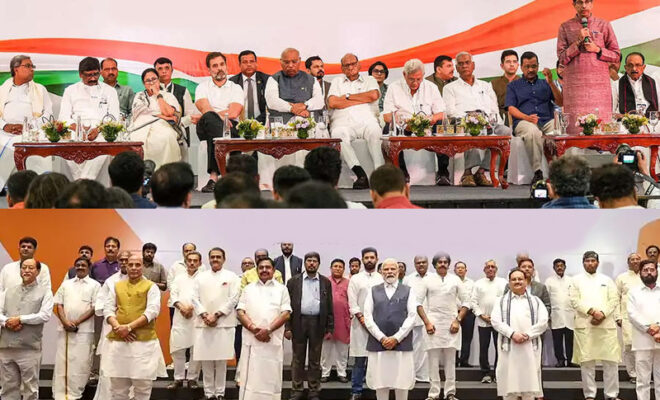Alliances in Indian politics: Unifying or dividing?

A common tactic used by political parties in India’s dynamic political system to increase their influence and win over voters is to form alliances. The National Democratic Alliance (NDA) and the recently formed I.N.D.I.A. coalition are two distinct electoral blocs that have developed over time as a result of alliances.
While these coalitions may seem to bring voters together under a single banner, they can unintentionally widen gaps between candidates, leaving voters with only two options when casting their ballots.
The emergence of political coalitions
Due to the diversity of the electorate in India, political alliances have become more popular. Through the creation of coalitions, parties can cross divides and increase their appeal to a wider range of voters due to the multiple regional, linguistic, and cultural identities.
National politics have been led by the NDA, which is led by the BJP, while the I.N.D.I.A. coalition has emerged as a counterweight to challenge the status quo.
Divided vs. united
On the surface, alliances appear to stand for harmony and the power of teamwork. They emphasize the capacity to unite groups with various ideologies in order to tackle the complex problems facing the country. As alliances expand, though, they might encourage a sense of “us vs. them” among voters, highlighting divisions based on political ideologies.
Polarising Impact:
Voters may align themselves along partisan lines as a result of the formation of obvious alliances like the NDA and I.N.D.I.A. Alliances run the risk of alienating moderate voters who may not fully identify with either bloc because they present starkly different policy visions. The political landscape may become more fragmented and contentious as a result of this polarisation.
Identity Politics’ Function:
Alliance formation is significantly influenced by identity politics. In order to strengthen their electoral bases, parties within the NDA and I.N.D.I.A. may target particular voter groups based on their affiliations with a particular caste, religion, or region. This tactic aids in winning votes, but it may exacerbate social divisions and obstruct the creation of a truly inclusive and progressive country.
Effects on Governance
Alliances may have effects on governance as well. Coalitions with divergent ideologies may find it difficult to agree on crucial policy issues, resulting in legislative gridlock. As a result, governance may suffer, which would make it more difficult to carry out urgent reforms.
Optional Choices for Voters:
The emergence of two powerful alliances may unintentionally restrict voter options, giving voters only one choice during elections. This might be a problem because some voters might feel pressured to pick the “lesser of two evils” rather than a candidate who more closely resembles their values.
Fostering inclusivity and consensus formation:
Although forming alliances has been a popular political tactic, it is important to strike a balance between diversity and unanimity. In order to promote a more peaceful and productive political environment, parties should place a higher value on inclusivity and fostering consensus than identity-based politics.
ALSO READ : Nitish Kumar’s Big Win as High Court Upholds Bihar Caste Census
Conclusion:
Undoubtedly, alliances in Indian politics have the potential to bring parties together for a shared goal, as demonstrated by the coalition between the NDA and I.N.D.I.A. They should take care to avoid unintentionally widening rifts and undermining the principles of democratic governance. Only alliances that transcend identity politics and specific interests and are based on shared values, a dedication to advancement, and the pursuit of the common good can lead to true unity. As citizens, we should demand ethical leadership that places a high value on inclusivity and unity while encouraging politics that unite rather than divide the country.



